The political space on immigration in the United States ahead of the November midterms has largely been dominated by games of anti-immigrant one-upmanship between Republican presidential hopefuls. On September 14, 2022, two planes filled with approximately 50 migrants and asylum-seekers from Venezuela landed in Martha’s Vineyard, Massachusetts. The planes were sent by Florida Governor Ron DeSantis, who first flew the asylum-seekers from Texas to Florida before Martha’s Vineyard, under the deception that they would be arriving in Boston. The flights were perhaps the most extreme example of recent efforts by Republican governors to transfer migrants, refugees, and asylum-seekers to northern Democrat-controlled areas.
Much furor has focused on the cravenness of politicians using human beings as part of political stunts. Yet the needs of Venezuelans arriving at the southern border are also not being met by U.S. President Joe Biden’s administration. Years of political repression, violence, and economic insecurity in Venezuela have come to head to create the second largest external displacement crisis in the world with 6.8 million displaced — just behind Ukraine. However, the government has allocated just 15,000 spots for the upcoming fiscal year to refugee resettlement from all of Latin America and the Caribbean.
Refugee resettlement involves transferring refugees from countries where they have already sought asylum to a third country, usually from a developing country to a more developed state with higher economic capacity. It is one part of a multi-pillar global approach to protecting the over 100 million displaced both inside their countries and externally. Yet in fiscal year 2021, the United States resettled only 11,411 refugees — the lowest number since the program began in 1980. On October 3, the government announced that only 25,465 refugees had been resettled during fiscal year 2022, far below the cap of 125,000 set by the administration last May.
The Biden administration has explained this shortfall by pointing to the damage done to the resettlement system by former U.S. President Donald Trump’s administration, including through drastic funding cuts and staff reductions. While the administration has made some important progress in rebuilding resettlement, advocates, and elected officials from across the political spectrum have argued that the resettlement system remains critically underfunded. The government has acknowledged that reaching its goal of 125,000 refugees resettled this year will be once again an uphill battle.
As I and others have written elsewhere, the price of declining resettlement has been the rights of refugees and asylum-seekers and the crumbling of a global system of refugee protection established following World War II. But prioritizing refugee resettlement is important not only on humanitarian grounds. Instead, refugee resettlement should also be considered a crucial component of the administration’s broader migration management approach.
Expanding refugee resettlement would first acknowledge the very real increase in individuals arriving at the southern border for whom violence and political persecution have caused them to leave their homes and who have limited safe pathways without resettlement. Second, increasing refugee resettlement is a necessary part of preventing anti-democratic regimes from using migrants and refugees as blackmail to extract policy and economic concessions. The experience of the EU following the 2015 “migration crisis” offers a cautionary tale for the United States. Finally, resettlement is an important part of signaling credibility to refugee and migrant-hosting allies that the U.S. government is committed to sharing the responsibility of hosting, especially in conjunction with foreign aid.
First, increasing resettlement is necessary to provide safe and orderly pathways to individuals fleeing violence and persecution who qualify for asylum and refugee status. Venezuelans represent the fastest-growing population arriving at U.S. borders along with Cubans and Nicaraguans — all countries with authoritarian governments with whom the United States does not have diplomatic relations. In March 2021, the U.S. government granted temporary protected status (TPS) to Venezuelans who were physically present in the United States as of March 8, 2021 — excluding those who have arrived after or were expelled to Mexico under the Trump-era Remain in Mexico plan (whereby asylum-seekers had to wait in Mexico for hearings in a U.S. immigration court). With ongoing political repression in Venezuela and deteriorating economic and political conditions in neighboring countries hosting the majority of displaced Venezuelans during COVID-19, more and more Venezuelans have made the difficult decision to flee north to Mexico and the U.S. Increasing refugee resettlement would ensure that more people have safe pathways enabling them to avoid this dangerous journey.
Second, the United States’ ongoing failure to expand resettlement pathways makes it susceptible to blackmail by authoritarian and anti-democratic leaders, as evidenced by the actions of Belarus and Turkey toward Europe. In 2016, following a dramatic increase in arrivals driven by the civil war in Syria and political and economic instability in Northern Africa and Afghanistan, the EU struck a deal with Turkey to prevent onward migration from the country. Among other measures, the EU agreed to resettle one Syrian refugee for every Syrian sent back to Turkey in order to discourage smuggling. In practice, however, only approximately 28,000 Syrians were resettled under the scheme by March 2021. Instead, a combination of dramatically heightened border enforcement — with deadly consequences — and economic and military assistance to countries such as Turkey and Libya have been the primary backbone of EU migration policy over the past six years.
These policies have come at a steep cost. Countries bordering the EU have increasingly used the threat of onward migration by migrants, refugees, and asylum-seekers as political and economic leverage and cover for increasingly anti-democratic actions. Since the 2016 deal was struck, Turkey has repeatedly threatened to allow refugees and migrants to arrive at EU borders in order to extract aid. In an effort to pressure the EU to lift sanctions, in 2021 Belarusian President Aleksandr Lukashenko liberalized visa policies and facilitated migrant and refugees in attempting to cross the Polish border to the EU. While the EU only intensified sanctions as a result, it has turned a blind eye to human rights abuses by the Polish government, which civil rights groups have described as increasingly authoritarian. As other analysts have written, the weaponization of migrants towards growing anti-migrant Western states represents a serious security concern that U.S. policymakers should be keenly aware of.
Finally, a core component of U.S. migration strategy under the Biden administration has been foreign aid to sending countries and neighboring countries to improve economic conditions and facilitate migrant and refugee integration locally. On September 22, the United States announced an additional $376 million in assistance to Venezuelans and regional host communities, bringing the total aid for the Venezuelan crisis response to nearly $2.7 billion since 2017. In Central America, proposed U.S. assistance to tackle the root causes of migration by the administration totals $4 billion dollars from fiscal year 2021 to 2024. Yet there is little evidence that foreign aid alone prevents migration, especially when many individuals are migrating due to fear and persecution rather than solely economic concerns. Instead, as the administration itself acknowledged in its 2021 migration management strategy, aid is only one part of a broader approach toward refugee-hosting allies that includes the expansion of legal protection pathways such as refugee resettlement.
Failing to fulfill promises on resettlement risks endangering the administration’s entire approach to migration. Resettlement is an important part of signaling to allies that have generously welcomed refugees that the United States is willing to share in the responsibility to host them, particularly since the majority of refugees are in developing states with already-struggling economies. Doing so is also important to ensure that refugee and migrant rights are protected in first destination countries.
Refugee resettlement is not a substitute for protecting the legal right to seek asylum at the border and inside the United States, or developing non-refugee migration pathways for immigrants sorely needed in the U.S. labor force. Migrant, refugee, and asylum-seeker rights and norms of international law established over decades have rapidly deteriorated in recent years. The lessons of the Holocaust — where thousands of Jewish refugees were characterized as security threats by the U.S. government and turned away — appear to have faded into history. However, the United States has a chance to both restore this crucial regime of protection and bolster its migration strategy through increasing refugee resettlement. An August Pew Research Center survey showed that 72% of Americans support the United States taking in refugees from countries where people are trying to escape violence and war. Extensive research has further demonstrated that refugees greatly benefit the U.S. economy and society. As the administration and the world grapple with historic levels of displacement, increasing refugee resettlement is both a necessary and smart policy choice.
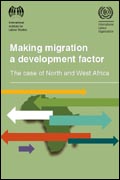
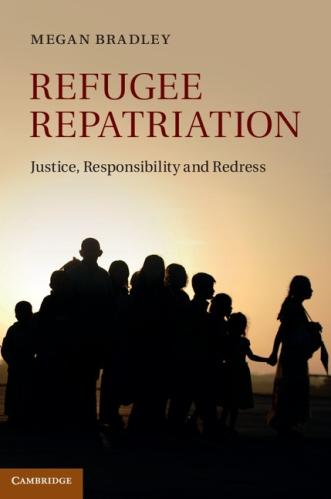

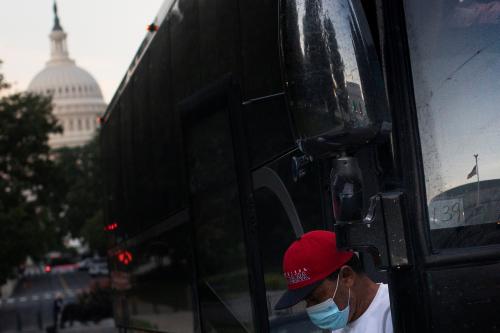
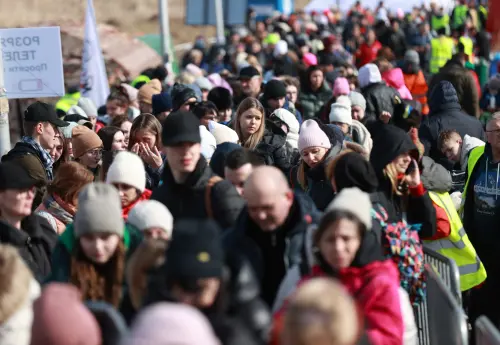
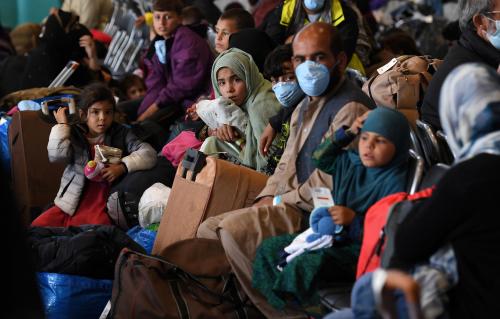

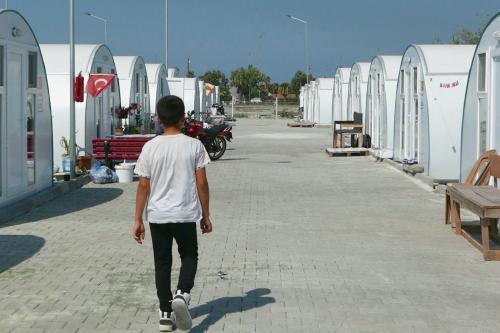
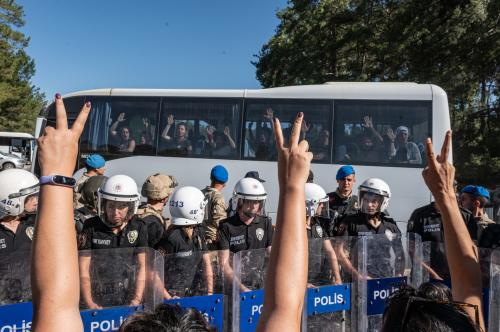
Commentary
Why refugee resettlement is a crucial part of US migration strategy
October 7, 2022